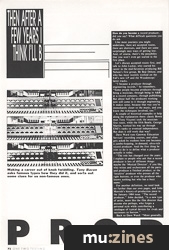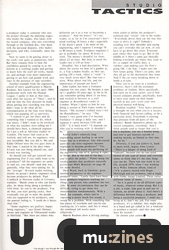Magazine Archive
Home -> Magazines -> Issues -> Articles in this issue -> View
Article Group: | |
A Producer's Life | |
Then After A Few Years I Think I'll Be A ProducerArticle from One Two Testing, November 1985 | |
making a career of knob twiddling
Making a career out of knob twiddling. Tony Bacon asks famous types how they did it, and sorts out some clues for us non-famous ones.

How do you become a record producer, did you say? What difficult questions you do ask.
Like most journeys you might undertake, there are accepted routes, there are shortcuts, and there are some surprisingly easy ways of getting lost. And, of course, there's the possibility that you won't even get started in the first place.
Let's discuss accepted routes first, and talk to John Leckie, who started his career in the mid-Seventies producing Bill Nelson's first group, Be Bop Deluxe, and who has most recently worked on the Fall's new LP and the Woodentops' latest tracks.
"I became a producer through engineering records," he remembers. "Some people become producers through being a musician, through being in A&R at a record company, through publishing. But about half the producers working now still come to it through engineering. It makes sense, because that way you're immediately closer to the music, and you know the techniques involved, too."
A couple of historical examples to help along the explanation there: classic Bowie man Tony Visconti took the musician-first route, while the fifth Beatle, George Martin, worked his way up through EMI's ranks to eventual independence. But does it still work that way?
Dave Ward runs Gateway Education Services' recording courses, and often gets asked by students how one becomes a jumbo-hopping, in-demand, ultra-rich record producer. And the first thing he tries to do is to define what a producer actually is today.
"The role has changed over the years: I explain to people who ask that a record producer is lots of different things: maybe the 'Musical Director', if you like, who writes and orchestrates all the parts and produces a finished product; or the 'intuitive' producer who presses all the right buttons; or even the producer who knows nothing but who has a buzz name."
For another definition, we need look no further than our own pages, and John Morrish's history-of-production piece in the January 1984 issue. "The record producer," John decided, "is a new type of artist, more like the film director than anyone else perhaps, who forges a personal style while contributing a catalogue of typical devices for rivals and successors to borrow."
Back to Dave Ward: "More generally, a producer today is someone who sees the project through the planning stages, who books the studio, who liases with the record company, who sees everything through to the finished disc, who deals with the personal disputes, who makes decisions, and who, eventually, takes the can."
Now we seem to be getting closer to the truth — not quite so glamorous, huh? But there remains little to beat the confidence gained by coming in at the bottom at a working studio and getting to know how the stuff all works, hands-on, and perhaps even more important, getting to see how real people work and react in the presence of tape recorders.
Another example from the engineering school of entry qualification is Martin Rushent, best known for his early 1980s production work with the Human League. I spoke to him at that time, soon after the success of "Dare", and he told me that the first decision he made about getting into recording was that he didn't want to do what all his contemporaries at the time were doing, which was popping off to university.
"I wanted to get out there and do something that I wanted to do, which was music. I didn't want to be involved in what my teachers were telling me I should have been, a chemical engineer. So I got a job at Advision studios in London. The hours that used to be worked, and still are, by engineers, were just incredible. But you did it. Me and Eddie Offord were the two guys there at that time: I started in the days when 4-track was just being phased out, and 8-track was starting."
So should you still get yourself into engineering first if you really want to be a producer? All the engineers we spoke to said yes, you should — and that was, generally, what they were aiming for. In the "average" 16-track studio working mainly on group's demos, engineers often become producers by default. Paul Craddock at Horizon studio in Coventry explains: "Bands come in who can barely play, let alone bring along a producer with them. So you're the producer. You do that, you start getting cocky, then eventually you get to meet the people who are supposed to be producers, and the general feeling is, 'I could do it better than that'."
"Some engineers are grafters, happy being engineers," says Stuart Skinner, owner and engineer at Vibrasound studio in Sheffield. "But there are others who definitely see it as a way to becoming a producer." And the hours? "It's my studio, so as far as I'm concerned I don't mind working 18 hours a day — especially if the music's good. I do most of the engineering, and I suppose I average 70 to 80 hours a week. Freelance engineers get in probably for about 30 hours a week. The money's dreadful for them, about £2 an hour. But bear in mind the studio rate is £10 an hour."
Dreadful. Not a bad description. What about the stories we hear of a gopher at, er, a Top London Studio, as they say, getting £50 a week, where a "week" is very much seven days? But that was a story. What about real life, and the importance of pounds per hour?
John Gallen has been a freelance engineer for two years. He became a tape op (= gopher) 10 years ago, as far as he can remember getting about £1 an hour, and worked in between as a staff engineer at Roundhouse studio in London. When I spoke to him he was doing a session at Park Gates studio Sussex. "My income's trebled since the Roundhouse," he says. "The money's very good now I've become freelance — I charge a daily rate, and suppose it varies between £150 and £250." Is it hard work? "It depends who you're working with. It shouldn't be."
And is John's relatively long engineering career leading to an even longer one as a producer. Our still-crucial question — do most engineers become engineers to become producers? "Yes. Some people still enjoy the perfecting of the engineering side of it, getting it right, or better. But at the end of the day, you're after the points." Points being the royalty-earners that producers naturally accrue (see Mark Brzezicki on page 68 for more details).
Dave Ward, back at Gateway, gives another perspective to the engineer-producer route. "Lately there have been more producer/engineers working on things, one person who combines the two jobs. In some circumstances that can be difficult, trying to get those two interpretations simultaneously. With a band, for example, where you're capturing a pretty much live sound, it would be a problem. With something that has plenty of overdubs and one-by-one tracking-on, it's easier, and this is where the combined job works more effectively."
Martin Rushent drew a driving analogy when asked to define the producer's technical and "social" role in the studio. "Everybody drives their car the way they want to drive it, right? Nobody's standing over their shoulder and saying you can't overtake this car now, or you have to go down this street. Everyone goes where they want to go. But in the middle of it there's some guy basically helping everybody get where they want to be — a copper on traffic duty, a warden — and making sure the flow's going OK. I do that, I make sure the flow keeps going. There's no jams, and they all get to the destination they want. And if the car starts breaking down or needs a re-tune..."
Once you're en route as a producer, however, there's still the attendant problems of fashion. More specifically, and early on in your career, you'd find record company people, specifically, keen to have your name on their bands' records at any cost — even your own physical/mental well-being.
Rushent recalled: "Very heavy pressure is brought on you when you're a success, both financial and favour-calling, to do a particular artist. Everybody is exerting that pressure from all parts of the industry. Bands themselves phone up, the record companies, everybody. And I think people tend to forget that you're not a machine, you are a human being and you've got interests outside of making records, as limited as they may be, ha ha."
Diversity, if you can achieve it, leads to more work, argues John Leckie. "There is a danger of being kind of 'typecast', because you do one good record of one type of music and everyone seems to think that it's the only thing you can do. There was one week in my life, around 1979, when I was working on a Wilko Johnson album, kind of r'n'b, a poetry record with Roger McGough and an orchestra, and a single with Public Image Limited. Three rather different kinds of music.
"So it is good to do all different types of music, whatever comes along. But it is a job, a trade, that goes in and out of fashion, no doubt about it. And there's a difference between being a producer, and being a successful producer. I make my living at it, that's my job. For some producers, it's a sideline, they might play in a band and get called in for a weekend to produce a record — and they may well have hit records."
So choose your course.
More with this topic
Graveyard rave - Criminal Justice Bill |
Risky Business |
 Are You Insured? - How To Avoid Losing Everything |
Up and Running - The Nightcatchers |
Doing the Business - Demos |
The Endorsement Syndrome |
 Airplay Action - grab your slice |
 A+R Approaches |
Splitting Image - Why Bands Break Up |
Making Studios Pay |
Independence Day - Indie Records (Part 1) |
Protection Racket |
Browse by Topic:
Music Business
Publisher: One Two Testing - IPC Magazines Ltd, Northern & Shell Ltd.
The current copyright owner/s of this content may differ from the originally published copyright notice.
More details on copyright ownership...
One Two Tactics
Feature by Tony Bacon
Help Support The Things You Love
mu:zines is the result of thousands of hours of effort, and will require many thousands more going forward to reach our goals of getting all this content online.
If you value this resource, you can support this project - it really helps!
Donations for April 2024
Issues donated this month: 0
New issues that have been donated or scanned for us this month.
Funds donated this month: £7.00
All donations and support are gratefully appreciated - thank you.
Magazines Needed - Can You Help?
Do you have any of these magazine issues?
If so, and you can donate, lend or scan them to help complete our archive, please get in touch via the Contribute page - thanks!












